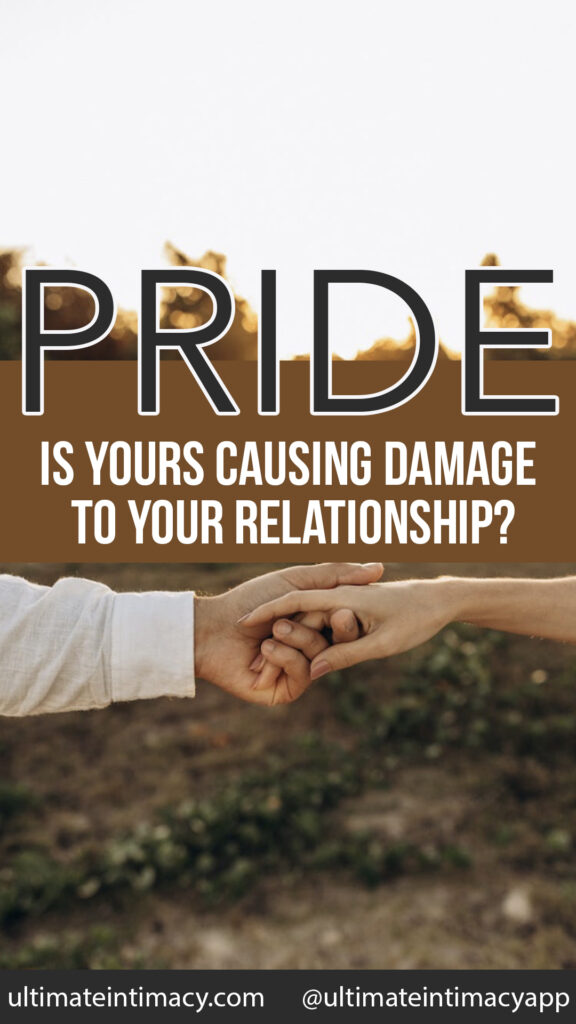Pride, a double-edged sword that can both bolster and fracture relationships, is often a silent antagonist in the dynamics between couple’s. While it’s natural to have a sense of self-worth and dignity, excessive pride can unwittingly wreak havoc on relationships, creating barriers to understanding and empathy.
In this article we will dive into the intricacies of pride, its detrimental effects, and actionable steps to mitigate its impact on relationships.
You may also enjoy this great podcast we did titled: 125. Is This Silent Relationship Killer Hurting Your Marriage?
Is pride hurting your marriage? Chances are, it is at some level. It has been said that pride is the silent killer of relationships!
Pride is something we all deal with at some level and it can fluctuate in our lives depending on where we are at and what we are going through. There may be some times in our live when our pride is high, and other times when we are humble. However… when left unchecked pride can destroy good relationships.
In this episode Nick and Amy identify how to know if pride is negatively impacting your relationship, AND things you can do to reduce it in your life.
Identifying the Presence of Pride
1. Reluctance to Admit Faults: A sure sign of pride is the unwillingness to acknowledge one’s mistakes or take responsibility for errors in a relationship. This resistance stems from an inflated sense of self-importance.
2. Unwillingness to Compromise: Excessive pride often manifests as an unwillingness to compromise or meet halfway in discussions or decisions, leading to conflicts or stalemates.
3. Defensiveness and Blame Game: A prideful individual might resort to defensiveness or shifting blame onto their spouse, avoiding introspection or accepting feedback.
4. Need for Control: A strong desire for control in every aspect of the relationship can signal an overbearing sense of pride.

The Detrimental Impact of Pride on Relationships
1. Communication Breakdown: Pride erects barriers to effective communication. It stifles the openness necessary for healthy dialogue and resolution of issues.
2. Erosion of Trust: Unyielding pride can erode trust within the relationship. Spouses may feel unheard, invalidated, or unable to express themselves freely.
3. Heightened Tensions and Conflict: Stubborn pride can escalate conflicts, intensifying tensions and making it challenging to find common ground or resolve disputes.
4. Emotional Distance: The presence of excessive pride can create emotional distance between spouses, hindering emotional intimacy and connection.
Check out this great article Overcoming the Relationship Killer: Pride.

Overcoming the Grip of Pride in Relationships
1. Cultivate Self-Awareness: Recognize and acknowledge moments when pride influences your behavior or responses. Self-awareness is the first step towards change.
2. Practice Humility: Embrace humility by acknowledging mistakes and taking responsibility for your actions. This fosters an environment of honesty and trust.
3. Open Communication and Empathy: Prioritize open, empathetic communication. Be willing to listen actively and understand your spouse’s perspective without letting pride cloud your judgment.
4. Foster a Culture of Compromise: Embrace compromise as a strength rather than a weakness. Finding middle ground fosters harmony and strengthens the bond between spouses.
5. Seek Professional Help if Needed: If pride becomes a persistent issue impacting the relationship, seeking guidance from a therapist or counselor can provide valuable insights and strategies for change.
Conclusion
Pride, when left unchecked, can silently corrode the foundation of even the strongest relationships. Embracing vulnerability and setting aside pride can pave the way for a more fulfilling and harmonious partnership, where both partners feel valued and heard.
Ultimate Intimacy


